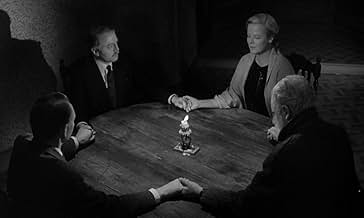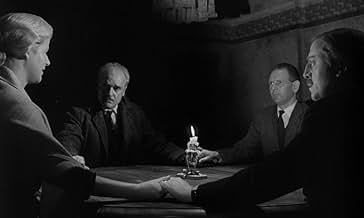Kim Stanley(1925-2001)
- Actress
Kim Stanley's movie roles were few and far between; she is perhaps best
known for her stellar performances on stage, including successes on
Broadway. But when she did step in front of the camera, nothing short
of memorable resulted. Her repertoire in movies and on stage covered
such diversity from the sensitive glamour-girl Rita Shawn character in
the 1958 "Goddess" to the crusty, somewhat salty and sunbaked Pancho
Barnes in 1983's The Right Stuff (1983). Her abilities to play such diverse roles and
play them well garnered her two Academy Award nominations: one for her
portrayal of the slightly unhinged medium in the 1964 Seance on a Wet Afternoon (1964) and
another for her characterization of the domineering and wrathful mother
of Frances Farmer in 1982's Frances (1982). Stanley was born Patricia Reid in
Tularosa, New Mexico. When her parents divorced, her mother moved the
family, sans father, to Texas where her mother found work as an
interior decorator. Drawn to both Texas and New Mexico, Stanley often
found herself lonely and unsure of what she wanted. As a child, she
wrote poetry and had many a daydream about becoming an artist or, on
the other hand, a May Queen. In school, she found she liked acting in
plays. At 16, in San Antonio she attended a touring production of "The
Philadelphia Story", which starred Katharine Hepburn. recreating her role from
the movie. Overwhelmed by the performance to the point of tears (she
didn't want the play to end), Stanley aspired to do what she had seen
Hepburn do. In college, she received a degree in psychology after
attending first the University of New Mexico and subsequently, the
University of Texas. But acting was still what she aspired to. So
pursuing a career connected neither to her college major nor to the
states where she grew up, Stanley eventually landed an acting
apprenticeship in California with the Pasadena Playhouse. Her stay
there was brief and she soon moved on to a winter stock company in
Louisville, Kentucky. From there, with $21 to her name, she traveled to
Manhattan. The year was 1947 and her Texas accent was still very much a
part of her persona -- so much so that many in the New York theatre
scene advised she go home to Texas. Persevering, however, Stanley made
ends meet as a dress model and as a cocktail waitress, all the while
honing her skills in off-Broadway productions of the Gertrude Stein ilk. It
was in Stein's "Yes Is for a Very Young Man," that New York Times
theatre critic Books Atkinson singled out Stanley as an actress with
promise (incidentally, he did not care much for the play she was in).
Stanley was also developing her craft under the tutelage of Elia Kazan and
Lee Strasberg at the Actors Studio in New York City, and scored her first
Broadway success in 1952 when, at the age of 27, she played the
12-year-old Millie Owens in William Inge's "Picnic". Subsequently, in the
1954 production of Inge's "Bus Stop," as the starry-eyed chanteuse
Cherie (a role Marilyn Monroe assumed for the film), Stanley ascended to even
greater heights and greater accolades in her acting achievements.
Though she preferred stage acting to any other facsimile and often
shied away from movies (reportedly, she declined to repeat for the
movies roles she mastered on stage), she frequently played roles on
television during the 1950s and '60s on such theatrical programs as
"Goodyear TV Playhouse" and "Magnavox Theater," garnering two Emmy
awards in the process (one in 1963 for her contributions to an episode
of Ben Casey (1961); the other for her Big Mama part in the 1984 PBS/American
Playhouse production of Tennessee Williams' "Cat on a Hot Tin Roof"). In the
latter part of her life, she gravitated toward teaching, conducting
acting classes in Los Angeles and, later, returning to her roots,
securing a position teaching acting at the College of Santa Fe in New
Mexico.
























